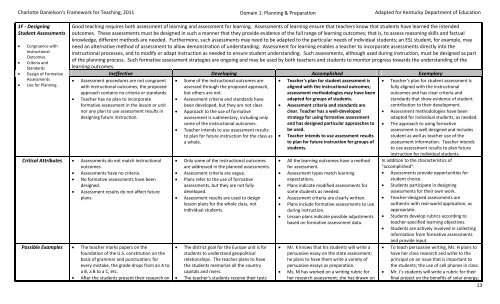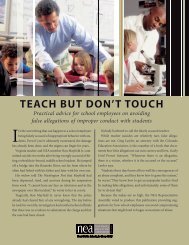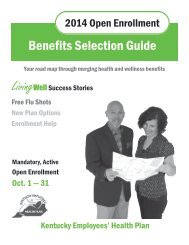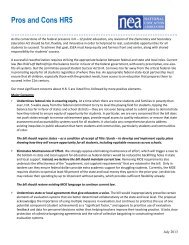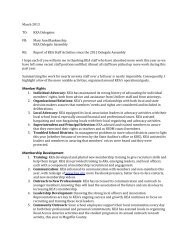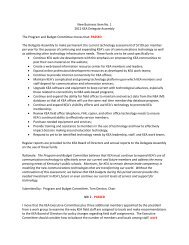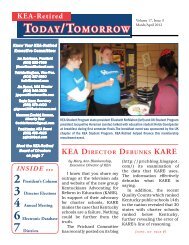Kentucky Adapted Danielson 2011 Framework - Kentucky Education ...
Kentucky Adapted Danielson 2011 Framework - Kentucky Education ...
Kentucky Adapted Danielson 2011 Framework - Kentucky Education ...
You also want an ePaper? Increase the reach of your titles
YUMPU automatically turns print PDFs into web optimized ePapers that Google loves.
Charlotte <strong>Danielson</strong>’s <strong>Framework</strong> for Teaching, <strong>2011</strong><br />
Domain 1: Planning & Preparation<br />
<strong>Adapted</strong> for <strong>Kentucky</strong> Department of <strong>Education</strong><br />
1F - Designing<br />
Student Assessments<br />
Good teaching requires both assessment of learning and assessment for learning. Assessments of learning ensure that teachers know that students have learned the intended<br />
outcomes. These assessments must be designed in such a manner that they provide evidence of the full range of learning outcomes; that is, to assess reasoning skills and factual<br />
Congruence with<br />
knowledge, different methods are needed. Furthermore, such assessments may need to be adapted to the particular needs of individual students; an ESL student, for example, may<br />
need an alternative method of assessment to allow demonstration of understanding. Assessment for learning enables a teacher to incorporate assessments directly into the<br />
Instructional<br />
instructional processes, and to modify or adapt instruction as needed to ensure student understanding. Such assessments, although used during instruction, must be designed as part<br />
Outcomes<br />
of the planning process. Such formative assessment strategies are ongoing and may be used by both teachers and students to monitor progress towards the understanding of the<br />
Criteria and<br />
Standards<br />
learning outcomes.<br />
Design of Formative<br />
Ineffective Developing Accomplished Exemplary<br />
<br />
Assessments Assessment procedures are not congruent Some of the instructional outcomes are Teacher's plan for student assessment is Teacher's plan for student assessment is<br />
Use for Planning<br />
with instructional outcomes; the proposed assessed through the proposed approach, aligned with the instructional outcomes; fully aligned with the instructional<br />
approach contains no criteria or standards. but others are not.<br />
assessment methodologies may have been outcomes and has clear criteria and<br />
Teacher has no plan to incorporate Assessment criteria and standards have<br />
adapted for groups of students.<br />
standards that show evidence of student<br />
formative assessment in the lesson or unit been developed, but they are not clear. Assessment criteria and standards are<br />
contribution to their development.<br />
nor any plan to use assessment results in<br />
designing future instruction.<br />
Approach to the use of formative<br />
assessment is rudimentary, including only<br />
clear. Teacher has a well-developed<br />
strategy for using formative assessment<br />
Assessment methodologies have been<br />
adapted for individual students, as needed.<br />
some of the instructional outcomes.<br />
and has designed particular approaches to The approach to using formative<br />
Teacher intends to use assessment results be used.<br />
assessment is well designed and includes<br />
to plan for future instruction for the class as<br />
a whole.<br />
Teacher intends to use assessment results<br />
to plan for future instruction for groups of<br />
students.<br />
student as well as teacher use of the<br />
assessment information. Teacher intends<br />
to use assessment results to plan future<br />
instruction for individual students.<br />
Critical Attributes Assessments do not match instructional<br />
outcomes.<br />
Only some of the instructional outcomes<br />
are addressed in the planned assessments.<br />
All the learning outcomes have a method<br />
for assessment.<br />
In addition to the characteristics of<br />
"accomplished":<br />
Assessments have no criteria.<br />
Assessment criteria are vague.<br />
Assessment types match learning<br />
Assessments provide opportunities for<br />
No formative assessments have been Plans refer to the use of formative<br />
expectations.<br />
student choice.<br />
designed.<br />
assessments, but they are not fully Plans indicate modified assessments for Students participate in designing<br />
Assessment results do not affect future<br />
developed.<br />
some students as needed.<br />
assessments for their own work.<br />
plans.<br />
Assessment results are used to design Assessment criteria are clearly written. Teacher-designed assessments are<br />
lesson plans for the whole class, not<br />
individual students.<br />
Plans include formative assessments to use<br />
during instruction.<br />
authentic with real-world application, as<br />
appropriate.<br />
Lesson plans indicate possible adjustments<br />
based on formative assessment data.<br />
Students develop rubrics according to<br />
teacher-specified learning objectives.<br />
Students are actively involved in collecting<br />
information from formative assessments<br />
and provide input.<br />
Possible Examples The teacher marks papers on the<br />
foundation of the U.S. constitution on the<br />
basis of grammar and punctuation; for<br />
every mistake, the grade drops from an A to<br />
The district goal for the Europe unit is for<br />
students to understand geopolitical<br />
relationships. The teacher plans to have<br />
the students memorize all the country<br />
Mr. K knows that his students will write a<br />
persuasive essay on the state assessment;<br />
he plans to have them write a variety of<br />
persuasive essays as preparation.<br />
To teach persuasive writing, Ms. H plans to<br />
have her class research and write to the<br />
principal on an issue that is important to<br />
the students; the use of cell phones in class.<br />
a B, a B to a C, etc.<br />
capitals and rivers.<br />
Ms. M has worked on a writing rubric for Mr. J's students will write a rubric for their<br />
After the students present their research on The teacher's students receive their tests her research assessment; she has drawn on final project on the benefits of solar energy;<br />
13


